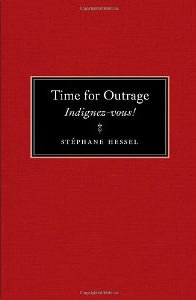Book Notes
 Stephane Hessel, Time for Outrage: Indignez-vous! (New York: Hachette, 2011 English translation), 41pp.
Stephane Hessel, Time for Outrage: Indignez-vous! (New York: Hachette, 2011 English translation), 41pp.
This tiny tract measures just four by six inches in its book form, but it has nonetheless taken France by storm and is now available in English translation. The original 2010 print run in France was only 6,000 copies, but to date Hessel's essay has sold at least 3.5 million copies worldwide and been translated into a dozen languages. I read the book after seeing Hessel featured on the PBS News Hour. Stephane Hessel (b. 1917) is a Jewish concentration camp survivor, a proud member of the French Resistance, a UN diplomat instrumental in writing the Universal Declaration of Human Rights (1948), and at age 94 still a fervent human rights advocate who has, as he puts it, "always sided with the dissidents." His essay has clearly tapped into popular outrage, much like the various "Occupy" protests have in America.
The "basic motivation of the Resistance" against Nazism, says Hessel, was indignation against every form of dehumanization. We need to recover that sense of outrage in our own day, for "the wealthy have installed their slaves in the highest spheres of the state. The banks are privately owned. They are concerned only with profits. They have no interest in the common good. The gap between rich and poor is the widest it's ever been; the pursuit of riches and the spirit of competition are encouraged and celebrated." Illegal workers and immigrants are humiliated. A truly free press is under siege in many places.
Hessel challenges our generation to move from indifference to indignation. "You must engage — your humanity demands it." Yes, today's world is more complex than that of World War II, but every person can find a cause and make a difference. Hessel mentions his defense of Algeria's independence, for example, and his outrage at Israel's treatment of the Palestinians. He calls for non-violent indignation and protest. This little tract for the times reminded me of the statement by one of Hessel's French contemporaries, the sociologist and Christian Jacques Ellul of Bordeaux (who was also a member of the Resistance): "to exist is to resist" (Exister, c’est résister). And for a more theological trajectory there's always Walter Wink's trilogy on the powers, the third of which is Engaging the Powers: Discernment and Resistance in a World of Domination (1992).


